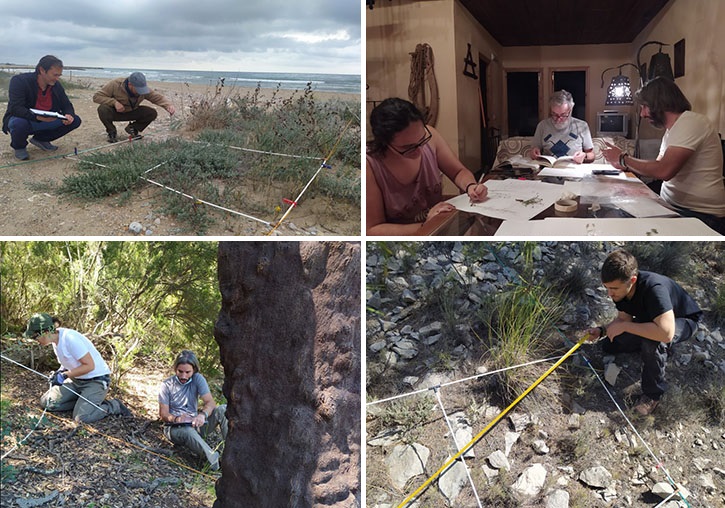
Researchers from 23 countries on 5 continents, coordinated by the Center for Research on Desertification (CIDE, UV/CSIC/GVA), collaborate and provide open data related to the processes of association between plants. The data collected over 15 years will contribute to knowledge about the stability and dynamics of plant communities and ecosystems.
An article recently published in the journal Ecology presents, for the first time, a global and open database of recruitment networks of different plant species throughout the planet. Researchers from institutions on five continents have participated in this work, coordinated by Miguel Verdú, CSIC researcher at the Desertification Research Center (CIDE, CSIC-UV-GVA).
A recruitment network (RN) describes how plant species are related to each other in a plant community and, specifically, describes which plants establish themselves below which others. These relationships do not occur randomly but rather follow a structured network of interactions between plants that have profound implications for their composition, diversity and structure, as well as for the maintenance of plant communities in ecosystems.
Although the mechanisms underlying recruitment interactions between species are well understood, little is known about the structure of recruitment networks at the larger scale, ecological communities. In this sense, the database established here brings together data from 143 ecological networks of plant communities in 23 countries, including temperate and tropical ecosystems. Each network identifies the adult plant of the already established species and those recruited below it in a given community. All the networks studied report the number of recruits per established species. With all this, the data set includes 850,000 recruits who participate in interactions between 3,318 species of vascular plants from around the world.
This vast amount of information, over a wide geographic range, can be used to build models that describe how species associate in a given community and how certain species are more likely to be replaced by others, affecting plant community stability and the coexistence of species. “These models provide a valuable opportunity to understand the rules that govern the interactions between species of communities in natural ecosystems, and contribute to improving knowledge about the functioning and maintenance of ecosystems”, explains Miguel Verdú, research professor at the CSIC and coordinator of this work.
A network of networks
The data collected here is the result of the collaborative work of 97 researchers who have exchanged information for 15 years, in which the interactions between plants have been analysed within a wide range of terrestrial plant communities, including forests, shrublands and grasslands. This has required the establishment of basic methodological guidelines to standardise sampling methods that could make future studies of these networks directly comparable.
RecruitNet: A global database of plant recruitment networks. Verdú, M., Garrido, J. L., Alcántara, J. M., Montesinos-Navarro, A., Aguilar, S., Aizen, M. A., Al-Namazi, A. A., Alifriqui, M., Allen, D., Anderson-Teixeira, K. J., Armas, C., Bastida, J. M., Bellido, T., Bonanomi, G., Briceño, H., Camargo, R., Campoy, J. G., Chaieb, G., Chu, C., Collins, S. E., Condit, R., Constantinou, E., Degirmenci, C. Ü., Delalandre, L., Duarte, M., Faife-Cabrera, M., Fazlioglu, F., Fernando, E. S., Flores, J., Flores-Olvera, H., Fodor, E., Ganade, G., García, M., García-Fayos, P., Gavini, S. S., Goberna, M., Gómez-Aparicio, L., González-Pendás, E., González-Robles, A., Hubbell, S. P., Ipekdal, K., Jorquera, M. J., Kikvidze, Z., Kütküt, P., Ledo, A., Lendínez, S., Li, B., Liu, H., Lloret, F., López, R. P., López-García, Á., Lortie, C. J., Losapio, G., Lutz, J. A., Luzuriaga, A. L., Máliš, F., Manrique, E., Manzaneda, A. J., Marcilio-Silva, V., Michalet, R., Molina-Venegas, R., Navarro-Cano, J. A., Novotny, V., Olesen, J. M., Ortiz-Brunel, J. P., Pajares-Murgó, M., Parissis, N., Parker, G., Paterno, B. G., Perea, A. J., Pérez-Hernández, V., Pérez-Navarro, M., Pistón, N., Pizarro-Carbonell, E., Prieto, I., Prieto-Rubio, J., Pugnaire, F.I., Ramírez, N., Retuerto, R., Rey, P. J., Rodriguez-Ginart, D. A., Rodríguez-Sánchez, M., Sánchez-Martín, R., Schöb, C., Tavsanoglu, Ç., Tedoradze, G., Tercero-Araque, A., Tielbörger, K., Touzard, B., Tüfekcioglu, I., Turkis, S., Usero, F. M., Usta-Baykal, N., Valiente-Banuet, A., Vargas-Colin, A., Vogiatzakis, I., Zamora, R. 2022.

















